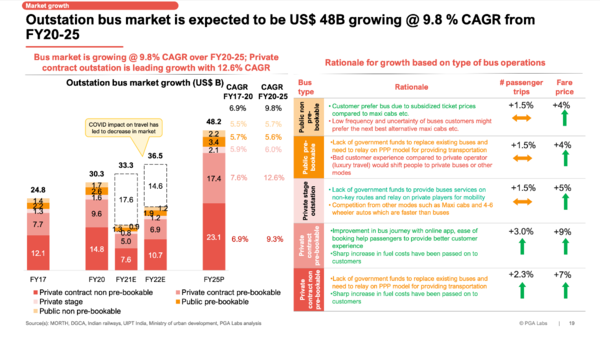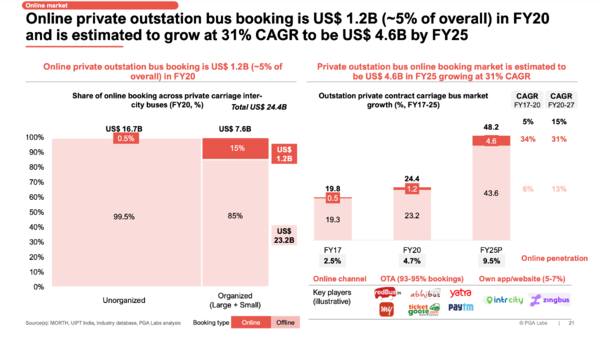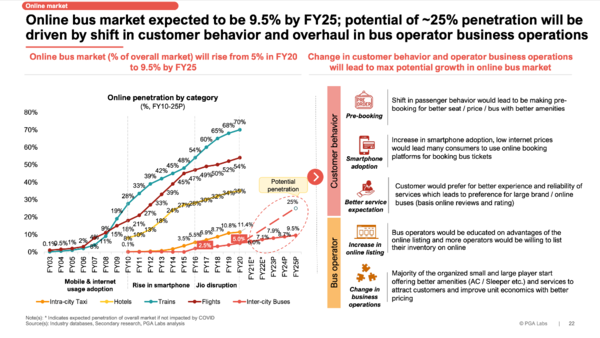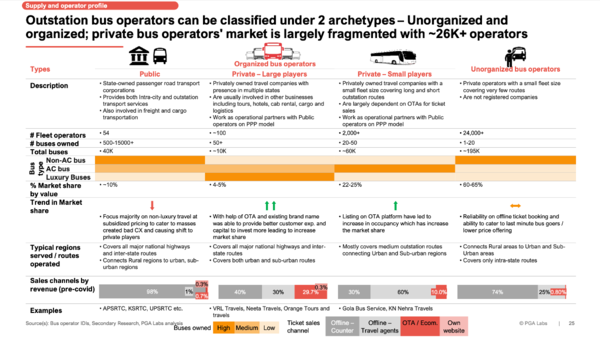credit: PGA Labs
Therefore, the total outdoor bus market in India is valued at US$30.3 billion, of which US$24.4 billion is private contract carriages such as ZingBus, which participates in the pre-bookable private contract carriage segment of US$9.6 billion. The survey also indicates that 18 per cent of the total bookings made in the USD 66 billion external market are booked online through travel portals and aggregators. Only 5 per cent of outstation bus rides are booked through online methods in FY20, which is valued at USD 1.2 billion.

credit: PGA Labs
But the good news is that the outstation bus market is expected to grow at a CAGR of 9.8 per cent between FY20-25 to USD 48 billion. Out of this, the private outstation bus online booking market is expected to grow at a CAGR of 31 per cent by FY25. This will increase its revenue value to USD 4.6 billion. The rationale behind this is the ease of booking through online mode which provides better customer experience while opting for pre-bookable private contractors. The burden of increasing fuel cost is also passed on to the customers. In comparison, the public bus sector suffers from poor customer experience and paucity of government funds to replace existing buses.

credit: PGA Labs
Change in customer behaviour, smartphone and internet access is essential behind the development:
While the online bus market is expected to see an overall growth of 9.5 per cent in FY25 from 5 per cent in FY15, it will be a change in customer behavior that has the potential to unlock up to 25 per cent penetration. This will also help in bus operation and overhaul. Business practices in the country.

credit: PGA Labs
Customer behavior change has been categorized into 3 major categories, pre-booking, smartphone adoption and improved service expectation (based on reviews and ratings). Meanwhile, the overhaul of bus operators has been classified under growth in online listings and changes in business operations.
Under the survey, outstation bus operators have been divided into two categories. unorganized and organized. At present, the private bus operators market has over 26,000 operators and is largely fragmented. Of this, organized bus operators (private and large) operate only 10,000 buses and hold 5 per cent of the market share. Whereas the unorganized bus operators have 60-65 per cent market share with over 195,000 buses. The organized segment is expected to gain ground with the help of OTAs, established brand names and better customer experience. But unorganized operators are also expected as they offer reliable offline booking, the ability to cater to last-minute travelers, low prices and rural access points.

credit: PGA Labs
‘One Nation, One Permit’ could be key behind revenue value of US$ 48 billion by 2025
The government’s ‘One Nation, One Permit’ (ONOP) scheme could boost inter-state travel, easier and faster processing of permits for operators with an increase of 9.8 per cent CAGR to the industry. Whereas pre-ONOP operators were often constrained by the need for multiple state permits to operate in different areas and other contingencies. However, with the implementation of onop, will streamline a single permit operation and also introduce a web-based application, payment and grant system. This will largely reduce the time taken to obtain permits, reduce costs, open access to more routes and increase the number of bus availability.

credit: PGA Labs